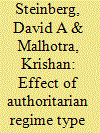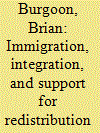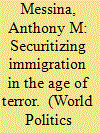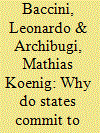|
|
|
Sort Order |
|
|
|
Items / Page
|
|
|
|
|
|
|
| Srl | Item |
| 1 |
ID:
132506


|
|
|
|
|
| Publication |
2014.
|
| Summary/Abstract |
Bilateral flows of international migrants exhibit tremendous variance both across destination countries and over time. To explain this variance, studies of international migration tend to focus on economic determinants such as income differentials or on social conditions such as the presence of coethnics in certain destination countries. The authors argue that migration is driven not solely by economic or social determinants; rather, the political environment across destinations plays a substantively large role in influencing bilateral migration flows. They test the importance of the political environment-citizenship rights and the prominence of right-wing parties-using data on migration flows from 178 origin countries into 18 destination countries over the period 1980-2006. They find, even after controlling for a variety of economic, social, policy, and international variables, that variation in political environments across time and destination plays a key role in observed patterns of international migration
|
|
|
|
|
|
|
|
|
|
|
|
|
|
|
|
| 2 |
ID:
132508


|
|
|
|
|
| Publication |
2014.
|
| Summary/Abstract |
Conventional wisdom holds that autocracies are more likely than democracies to adopt interventionist and protectionist economic policies, including fixed and undervalued exchange rates. This article suggests that this view is only partially correct: nondemocracies are a heterogeneous grouping, and only some types of authoritarian regimes adopt different foreign economic policies from those of their democratic counterparts. Using the example of exchange rate policy, the authors show that foreign economic policy varies across monarchic, military, and civilian dictatorships. More specifically, they hypothesize that monarchies and military regimes are more likely than democracies and civilian dictatorships to maintain fixed exchange rate regimes because the former regimes have smaller "selectorates" than the latter. The authors also expect that monarchies and civilian dictatorships maintain more undervalued exchange rates than democracies and military regimes because the former regimes provide their leaders with greater tenure security than the latter regimes. These hypotheses are evaluated using a time-series-cross-sectional data set of a large sample of developing countries from 1973 to 2006. The statistical results accord with these predictions. These findings indicate that the ways in which democracies engage with the global economy may be less unique than many believe.
|
|
|
|
|
|
|
|
|
|
|
|
|
|
|
|
| 3 |
ID:
132505


|
|
|
|
|
| Publication |
2014.
|
| Summary/Abstract |
Immigration poses individual or collective economic risks that might increase citizen support for government redistribution, but it can also generate fiscal pressure or undermine social solidarity to diminish such support. These offsetting conditions obscure the net effects of immigration for welfare states. This article explores whether immigration's effects are mediated by the economic and social integration of immigrants. Integration can be conceptualized and measured as involving the degree to which immigrants suffer unemployment rates, depend on welfare-state benefits, and harbor social attitudes similarly to the native population. Such integration may alter how immigration reduces solidarity and imposes fiscal and macroeconomic pressures, but does not much alter how immigration spurs economic risks for natives. Where migrants are more integrated by such measures, immigration should have less negative or more positive implications for native support for government redistribution and welfare states than where migrants are less integrated. The article explores these arguments using survey data for twenty-two European countries between 2002 and 2010. The principal finding is that economic integration, more than sociocultural integration, softens the tendency of immigration to undermine support for redistributive policies.
|
|
|
|
|
|
|
|
|
|
|
|
|
|
|
|
| 4 |
ID:
132509


|
|
|
|
|
| Publication |
2014.
|
| Summary/Abstract |
In the context of the evidence presented in both the collected scholarship under review and other select works, this article asks if and to what extent migration-related issues have been securitized in Europe and the United States. In addressing these questions it executes three tasks. First, it critically assesses the four major dimensions across which contemporary immigration purportedly is securitized: on one side, rhetorically addressing immigration-related issues through political elite discourse, public opinion, and the mass media; and on the other, the policy processes through which immigration is securitized. Second, this article identifies the strengths and weaknesses of securitization theory as it has been applied to immigration. Finally, it draws mostly negative conclusions about the veracity of the central claims of the securitization of immigration literature and, specifically, its causal story.
|
|
|
|
|
|
|
|
|
|
|
|
|
|
|
|
| 5 |
ID:
132507


|
|
|
|
|
| Publication |
2014.
|
| Summary/Abstract |
Ratifying core conventions adopted by the International Labor Organization (ILO) creates legal obligations to improve labor standards in the domestic economy, notably with regard to union rights, minimum age and discrimination in employment, and forced labor. Why and when do states choose to ratify them? Two influential theoretical approaches lead to the expectation that states are influenced by the ratification behavior of other states. Drawing on rationalist institutionalism, the authors expect states to use institutions such as the ILO to improve or consolidate their preferred standards domestically while reducing the risk of suffering competitive disadvantages in world markets. In this view, ILO conventions are devices for the prevention and mitigation of regulatory races to the bottom among trade rivals. Drawing on sociological institutionalism, they expect states to ratify ILO conventions if doing so conforms to a norm of appropriate behavior that is prevalent in a state's peer groups. This article develops observable implications of these hypotheses and tests them by applying spatial regression models to seven core ILO conventions and 187 countries between 1948 and 2009. The analysis yields strong evidence in support of both hypotheses.
|
|
|
|
|
|
|
|
|
|
|
|
|
|
|
|
|
|
|
|
|